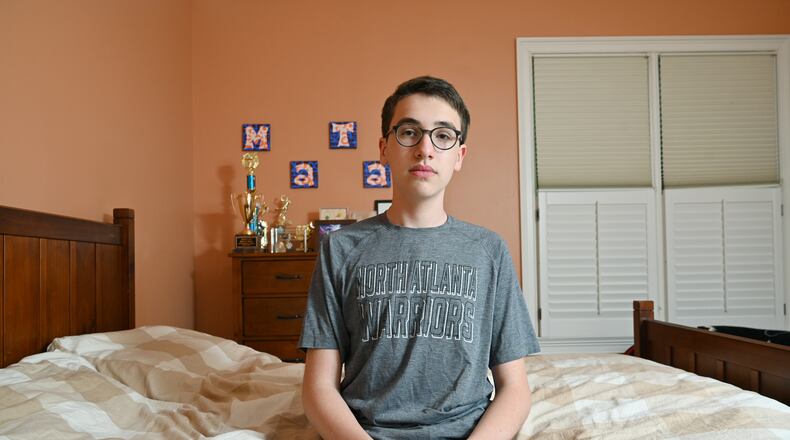When Atlanta high school students learned their classes would start 45 minutes earlier in the upcoming school year, they counted backwards.
The new 7:45 a.m. morning bell time means earlier wake-ups and bus pick-ups for thousands of teens. For Matan Berg, a sophomore at North Atlanta High School, it could require rising before 6 a.m., an hour he calls “outrageously early.”
”I have yet to meet one person who is happy with the decision,” he said.
Atlanta Public Schools Superintendent Lisa Herring announced the change recently in a letter.
The district is extending the elementary day by 30 minutes to help students who have fallen behind during the pandemic. High school start times will shift to accommodate transportation needs resulting from the new elementary schedule, she wrote.
A spokesman said Herring was unavailable for an interview Wednesday. In a written statement, she said APS reviewed start times of other urban districts and received input from teacher and principal advisory groups.
“We know this decision brings about a change for many of our families, and I want our families to know that their voices are critically important in this process,” her statement said. “We are planning additional opportunities for community engagement as we socialize this change.”
But critics said APS failed to seek family feedback and said the decision defies scientific findings.
Matan posted a petition opposing the change around 12:30 a.m. Saturday. (Further evidence, the 16-year-old said, “that teens work better at night.”) It has garnered more than 2,100 signatures.
Among those joining the cause are parents and experts, who point to research that shows later start times lead to better academic performance and health. The American Academy of Pediatrics advises middle and high schools start at 8:30 a.m. or later.
“One has to be awake to learn. If you have your children sleeping on desks in school, they’re not learning,” said Phyllis Payne, implementation director for Start School Later, a Maryland-based nonprofit.
Teens need eight to 10 hours of sleep each night, she said. Later starts mean car crashes, tardiness, and disciplinary cases go down and graduation rates improve, she said.
Parents can’t just tell their teen to go to bed earlier. Sleep cycles shift during puberty, so it’s tougher for them to fall asleep as early as younger students or adults, Payne said.
Richard Quartarone, president of the Atlanta Council of PTAs, said the district’s decision appears rooted in an effort to support elementary students. But, he said, “it could have a damaging effect on older children.”
He’s also concerned the change will add stress to “overburdened, overworked” teachers.
Quartarone was impressed by how APS leaders cited COVID-19 experts in school reopening decisions this year. But, he said, the new start time seems like a sharp contrast to a science-backed approach.
Only a quarter of Atlanta’s roughly 11,000 high school students are learning in-person right now. That means most can roll from their beds to their laptops to log in for class. In August, when many more return to campuses, they’ll need extra time each morning to get to school.
Hollis Chamberlain wonders how families with students in different grades will juggle. Some working parents rely on older children to help younger siblings get ready.
Next year, elementary schools will start a half-hour later, at 8:30 a.m. By then, high school classes will be underway. Middle school start times will remain at 9:05 a.m.
“APS makes these decisions in a vacuum,” said Chamberlain, who has two high schoolers in the district.
Mesha Mainor’s daughter is currently choosing classes for her junior year. She’s thinking about taking fewer Advanced Placement courses so she can balance homework and the earlier schedule.
Mainor, who represents portions of Atlanta in the Georgia House of Representatives, is concerned about how the change will affect students trying to keep up with a rigorous academic load and their mental health.
Credit: HYOSUB SHIN / AJC
Credit: HYOSUB SHIN / AJC
At North Atlanta High, Matan plans to finish the International Baccalaureate diploma program. He currently studies from about 7 p.m. until midnight, then goes to bed.
The way the district dropped the news upset him, especially since he said the decision flies in the face of “the overwhelming scientific consensus.”
“At the very least, I think APS owes us all an explanation and hopefully, in addition, some sort of reform or reversal of the policy,” he said.
Metro Atlanta high school start times
Atlanta: 7:45 a.m., starting in August
Clayton: 8:15 a.m.
Cobb: 8:20 a.m.
DeKalb: 8 a.m. for most
Fulton: 8:20 a.m. for most
Gwinnett: 7-7:20 a.m. for most
About the Author
Keep Reading
The Latest
Featured




